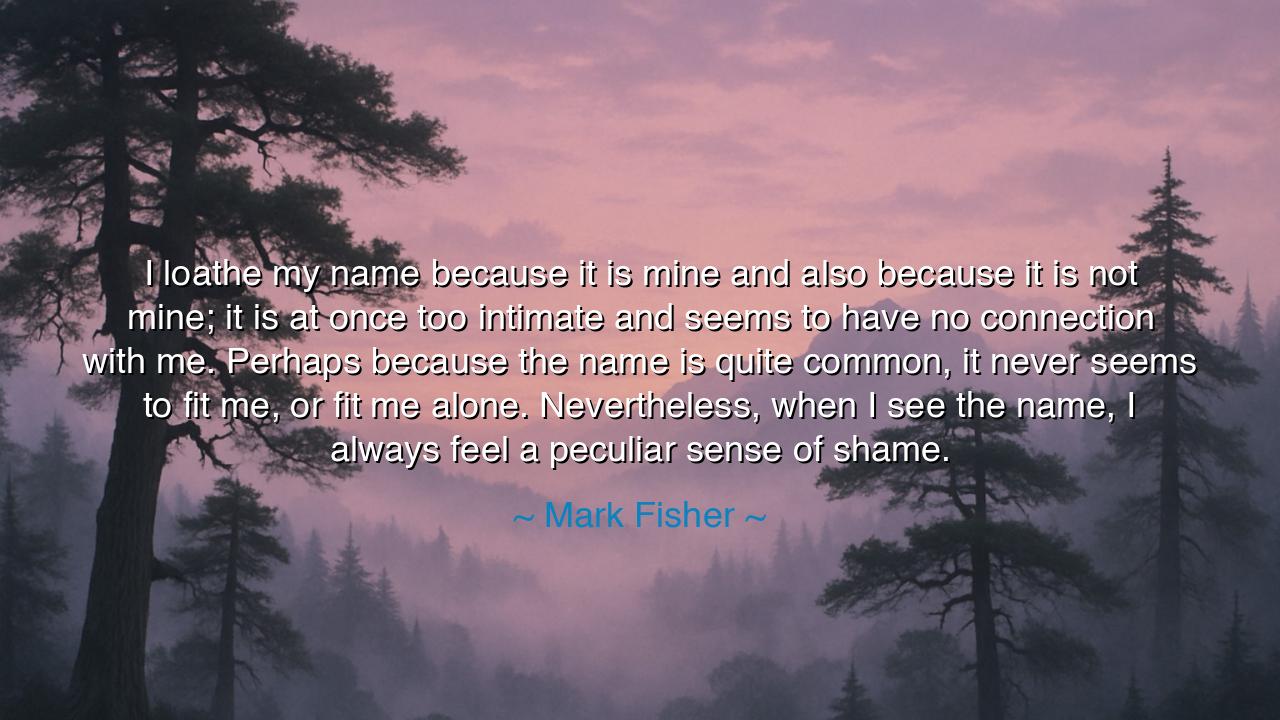
I loathe my name because it is mine and also because it is not
I loathe my name because it is mine and also because it is not mine; it is at once too intimate and seems to have no connection with me. Perhaps because the name is quite common, it never seems to fit me, or fit me alone. Nevertheless, when I see the name, I always feel a peculiar sense of shame.






When Mark Fisher confessed, “I loathe my name because it is mine and also because it is not mine; it is at once too intimate and seems to have no connection with me. Perhaps because the name is quite common, it never seems to fit me, or fit me alone. Nevertheless, when I see the name, I always feel a peculiar sense of shame,” he gave voice to a feeling that lies deep in the heart of modern humanity — the estrangement of the self from its own identity. His words, at once intimate and philosophical, speak not merely of a man’s discomfort with his name, but of the alienation of the soul in an age where meaning, individuality, and belonging have become fragile illusions. In his lament, we hear the cry of one who looks upon his reflection and finds a stranger staring back.
Mark Fisher, a cultural critic and philosopher, was a man haunted by the machinery of modern life — the way capitalism and technology hollow the human spirit, turning names, faces, and dreams into interchangeable symbols. To “loathe one’s name” is not a simple vanity; it is the symptom of a deeper fracture — a sense that the self no longer belongs fully to itself. Fisher felt, as many of us do in quiet hours, that his identity had been stolen by the world, reshaped by systems and expectations beyond his control. His name, which should have been a vessel of selfhood, became instead a mask, a sound too intimate to ignore yet too foreign to embrace.
This paradox — of being both too close to oneself and too far from oneself — has been the silent agony of thinkers throughout time. The ancients spoke of it in other forms. Socrates warned that the unexamined life was not worth living, for without self-knowledge, one becomes a stranger in his own house. In the Eastern wisdom of the Upanishads, the self is said to be both the smallest and the largest — invisible to the senses, yet infinite in being. Between these poles lies the human struggle: to recognize oneself without being consumed by self-consciousness. Fisher’s shame at his own name captures that struggle perfectly — the name is both a mirror and a chain, a mark of belonging and a reminder of limitation.
There is a quiet tragedy in this. Our names are the first gifts we receive from the world — bestowed upon us before we can speak, symbols of identity we did not choose. They tie us to our families, our histories, our nations, our cultures. But as we grow, we discover that our inner life, vast and unseen, cannot be contained by a few syllables. The name becomes too small for the spirit it carries. For some, this dissonance is mild, but for the deeply reflective — like Fisher — it becomes a wound: a symbol of existential alienation, of being both part of the world and apart from it.
History gives us many who have wrestled with this same paradox. Franz Kafka, whose name has become synonymous with alienation, once wrote that he felt “transparent, as though made of glass.” He too bore the burden of a name that could not hold his essence. His characters — K., Josef K., Gregor Samsa — are stripped of names or transformed into beings unrecognizable to themselves. Like Fisher, Kafka understood that in the modern age, identity itself becomes blurred, as if individuality has been replaced by a mechanized sameness. The name, once sacred, now feels like a brand — something the world uses to catalogue, not to know.
Yet in Fisher’s anguish, there is wisdom. His words teach us that shame at one’s name is not mere self-hatred — it is the recognition that the self is greater than any label, that the true spirit of a person cannot be confined by language. The discomfort he describes is the spiritual friction between who we are and who the world allows us to be. To feel that your name does not fit is to sense that you are not finished — that you are still unfolding, still becoming. It is a pain born of awareness, and awareness, though heavy, is the beginning of truth.
So, my children, take this teaching to heart: you are not your name, nor your titles, nor the words others use to describe you. The name is but a vessel; what it holds is infinite. Do not be ashamed of the distance between your inner world and your outer identity — it is the space where growth begins. Speak your name not as a prison, but as a question: “Who am I beneath this sound?” Live so that your deeds, your kindness, and your truth give new meaning to that name. Let your actions be your signature, and your integrity your title.
And remember the quiet wisdom of Mark Fisher’s sorrow: to feel estranged from oneself is not failure — it is awakening. In a world that demands conformity, the discomfort you feel within your own skin is a sign that your soul is still alive, still searching, still free. Embrace that unease, for it is the mark of depth. Do not flee from your name, but fill it with meaning until it no longer feels foreign. In the end, the name is not what defines the person — it is the person who redeems the name.






AAdministratorAdministrator
Welcome, honored guests. Please leave a comment, we will respond soon